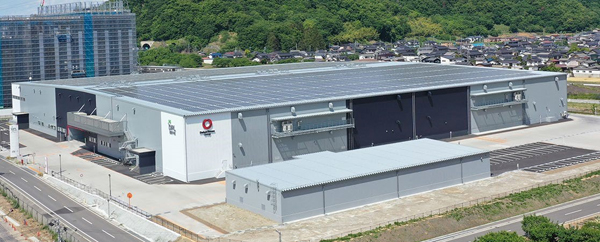Daiwa House Industry Co., Ltd.’s initiatives addressing “flood risk and heatstroke countermeasures” and “geothermal and waste heat utilization systems” have been highly praised by the Ministry of the Environment, earning the company the 2024 Minister of the Environment Climate Change Action Award. These achievements highlight Daiwa House’s innovative efforts toward building a sustainable future.

“16 Initiatives to Protect People, Communities, and Lives” Demonstrates Adaptation Strategies for Climate Change
The Future of Environmental Technologies Utilizing Geothermal and Waste Heat
Pioneering Climate Change Adaptation
Under its environmental vision, “Challenge ZERO 2055,” Daiwa House Industry Co., Ltd. is working to achieve net-zero greenhouse gas emissions by its 100th anniversary. The company’s award-winning “16 Initiatives to Protect People, Communities, and Lives” has been recognized for its effective measures against flood risks and heatstroke. These efforts include flood protection measures for logistics facilities, disaster response agreements with municipalities, and the implementation of the “WHEATHERY” system, which visualizes and prevents heatstroke risks at construction sites.
Notably, the logistics facilities designed to reduce flood risks and the disaster response agreements established with 17 municipalities nationwide serve as practical disaster preparedness hubs. For instance, the “DPL Nagano Chikuma” facility in Nagano Prefecture can accommodate up to 48 evacuees during emergencies.
■Flood Risk Countermeasures at DPL Nagano Chikuma
Flood protection measures at offices located in hazard map-designated inundation areas
Stockpiling water, food, and other supplies for disaster scenarios, alongside conducting disaster drills
Conducting water risk assessments at supplier factories
Developing the “All-Weather 3-Battery Integrated System,” capable of supplying power for approximately 8 days during rain-induced outages
Designing residential subdivisions incorporating green infrastructure concepts
Proposing private buildings with a focus on BCP (Business Continuity Planning) measures
Developing “Mebiotope” technology for retaining and utilizing rainwater effectively
Constructing “Rain Gardens,” an innovative soil system with both infiltration and water retention capabilities
Developing technologies using satellite SAR (Synthetic Aperture Radar) to promptly assess damages from heavy rainfall disasters
Developing and operating flood alert systems using weather forecast data
Geothermal and Waste Heat Utilization System
Another award-winning initiative, the “Geothermal and Waste Heat Utilization System,” was implemented at a Mirai Industry factory in collaboration with Osaka Technocrat. This system efficiently repurposes geothermal energy and low-temperature waste heat for heating, cooling, and equipment operation using water-cooled heat pumps. It has achieved an annual reduction of over 1,000 tons of CO2 emissions compared to standard facilities. The system is slated for further deployment in factories nationwide.
Through these initiatives, Daiwa House Industry is setting a new model for technological innovation in addressing both climate change adaptation and mitigation. The company’s efforts serve as a pioneering example of sustainable practices in an era of climate crisis.
